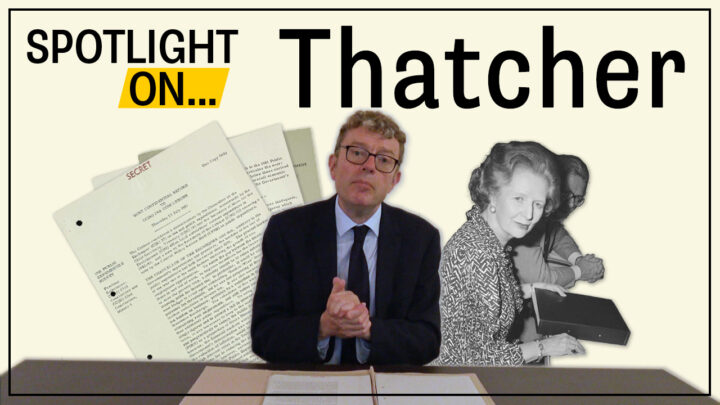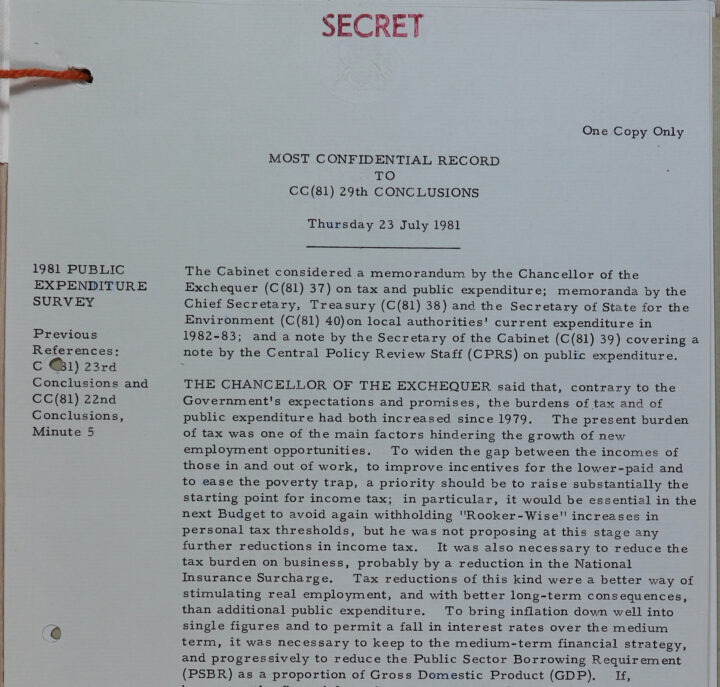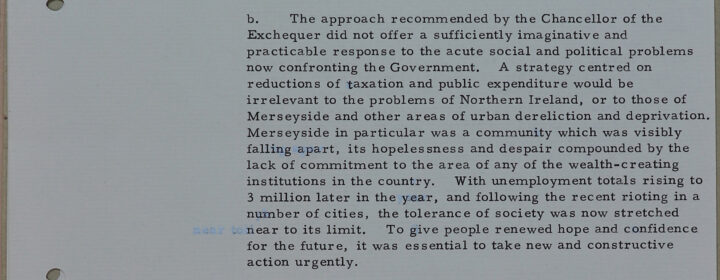
Cabinet Office: Records relating to Margaret Thatcher’s Government 1981
We hope you enjoyed watching our Education Service video with Records Specialist Mark Dunton looking at records from the Cabinet Office. This video focusses on one document relating to a cabinet meeting in 1981 during the premiership of Margaret Thatcher.
Download Spotlight On: Thatcher Resource Pack
Now try and answer the following questions:
- Which individuals form the Cabinet?
- What is the role of the Cabinet?
- How often does the Cabinet meet?
- What type of material can be found in the Cabinet Papers?
- When were the first Cabinet minutes created?
- What is the date of the Cabinet meeting examined here?
- What is the historical background for this document?
- Why is this document marked ‘Secret’?
- What were the government’s economic plans according to the document?
- What does the document show about divisions in the Cabinet over this economic policy?
- According to the video, were there further Cabinet meetings to discuss these differences?
- Who wrote the Cabinet Minutes?
- Why were they written?
- Why are Cabinet Minutes useful to historians?
- What other sources beyond Cabinet Papers records, would be important to explore when studying this topic?
Document 1
Extract from Cabinet Minutes, July 23rd, 1981. Catalogue Ref: CAB 128/72
Transcript
SECRET
One Copy Only
MOST CONFIDENTIAL RECORD
TO
CC (81) 29th CONCLUSIONS
Thursday 23 July 1981
The Cabinet considered a memorandum by the Chancellor of the Exchequer (C (81) 37) on tax and public expenditure; memoranda by the Chief Secretary, Treasury (C (81) 38) and the Secretary of State for the Environment (C (81) 40) on local authorities’ current expenditure in 1981-83; and a note by the Secretary of the Cabinet (C (81) 39) covering a note by the Central Policy Review Staff (CPRS) on public expenditure.
THE CHANCELLOR OF THE EXCHEQUER said that contrary to the Government’s expectations and promises, the burdens of tax and of public expenditure had both increased since 1979. The present burden of tax was one of the main factors hindering the growth of new employment opportunities. To widen the gap between the incomes of those in and out of work, to improve incentives for the lower-paid and to ease the poverty trap, a priority should be to raise substantially the starting point for income tax; in particular it would be essential in the next Budget to avoid again withholding “Rooker-Wise” increases in personal tax thresholds, but he was not proposing at this stage any further reductions in income tax. It was also necessary to reduce the burden on business, probably by a reduction in the National Insurance Surcharge. Tax reductions of this kind were a better way of stimulating real employment, and with better long-term consequences, than additional public expenditure. To bring inflation down well into single figures and to permit a fall interest rates over the medium term, it was necessary to keep the medium-term financial strategy, and progressively to reduce the Public Sector Borrowing Requirement (PSBR) as a proportion of Gross Domestic Product (GDP).
…
Document 2
Extract from Cabinet Minutes, July 23rd, 1981. Catalogue Ref: CAB 128/72
Transcript
[…]
b. The approach recommended by the Chancellor of the Exchequer did not offer a sufficiently imaginative and practicable response to the acute social and political problems now confronting the Government. A strategy centred on reductions of taxations and public expenditure would be irrelevant to the problems of Northern Ireland, or to those of Merseyside and other areas of urban dereliction and deprivation. Merseyside in particular was a community which was visibly falling apart, its hopelessness and despair compounded by the lack of commitment to the area of any of the wealth-creating institutions in the country. With unemployment totals rising to 3 million later in the year and following the recent rioting in a number of cities, the tolerance of society was now stretched near to its limit. To give people renewed hope and confidence for the future, it was essential to take new and constructive action urgently.
[…]
Connections to curriculum
Key stage 5
Edexcel A level History
Britain in the Later 20th Century: 1945- 90: Consensus and Conflict .
The Conservative election victory of 1979: reasons for it and key features of the domestic policy of Thatcher governments; domestic achievements; reasons why the Thatcher era was controversial; reasons for her fall in 1990.
OCR A level History
Britain under Margaret Thatcher 1979–90 Focus: why there was a change in direction in post-war British politics under Thatcher, the extent of the ‘revolution’ in social, economic and foreign policy and why Thatcher fell from power.
AQA A level History
The Making of Modern Britain, 1951–2007: the impact of Thatcherism, 1979–1987
Related Resources:
Here are some blogs from The National Archives which relate to Margaret Thatcher’s in office in the 1980s:
- Chancellor Geoffrey Howe’s 1981 budget – https://blog.nationalarchives.gov.uk/explore-sir-geoffrey-howes-private-office-papers/
- Margaret Thatcher meeting with Mikhail Gorbachev in 1985 – https://blog.nationalarchives.gov.uk/man-one-business/
- The AIDS health campaign of the 1980s – https://blog.nationalarchives.gov.uk/aids-health-campaign/
- The National Archives research guide: Political history in the twentieth century – https://www.nationalarchives.gov.uk/help-with-your-research/research-guides/political-history-20th-century/
- Cabinet Papers Website: https://www.nationalarchives.gov.uk/cabinetpapers/


